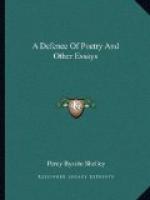We have more moral, political and historical wisdom, than we know how to reduce into practice; we have more scientific and economical knowledge than can be accommodated to the just distribution of the produce which it multiplies. The poetry in these systems of thought, is concealed by the accumulation of facts and calculating processes. There is no want of knowledge respecting what is wisest and best in morals, government, and political economy, or at least, what is wiser and better than what men now practise and endure. But we let ‘I dare not wait upon I would, like the poor cat in the adage.’ We want the creative faculty to imagine that which we know; we want the generous impulse to act that which we imagine; we want the poetry of life: our calculations have outrun conception; we have eaten more than we can digest. The cultivation of those sciences which have enlarged the limits of the empire of man over the external world, has, for want of the poetical faculty, proportionally circumscribed those of the internal world; and man, having enslaved the elements, remains himself a slave. To what but a cultivation of the mechanical arts in a degree disproportioned to the presence of the creative faculty, which is the basis of all knowledge, is to be attributed the abuse of all invention for abridging and combining labour, to the exasperation of the inequality of mankind? From what other cause has it arisen that the discoveries which should have lightened, have added a weight to the curse imposed on Adam? Poetry, and the principle of Self, of which money is the visible, incarnation, are the God and Mammon of the world.
The functions of the poetical faculty are two-fold; by one it creates new materials of knowledge and power and pleasure; by the other it engenders in the mind a desire to reproduce and arrange them according to a certain rhythm and order which may be called the beautiful and the good. The cultivation of poetry is never more to be desired than at periods when, from an excess of the selfish and calculating principle, the accumulation of the materials of external life exceed the quantity of the power of assimilating them to the internal laws of human nature. The body has then become too unwieldy for that which animates it.
Poetry is indeed something divine. It is at once the centre and circumference of knowledge; it is that which comprehends all science, and that to which all science must be referred. It is at the same time the root and blossom of all other systems of thought; it is that from which all spring, and that which adorns all; and that which, if blighted, denies the fruit and the seed, and withholds from the barren world the nourishment and the succession of the scions of the tree of life. It is the perfect and consummate surface and bloom of all things; it is as the odour and the colour of the rose to the texture of the elements which compose it, as the form and splendour of unfaded




